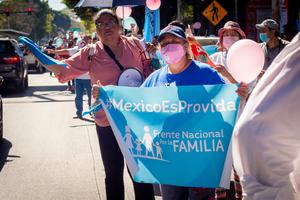Vatican Cardinals Laud US Supreme Court’s Dobbs Decision
Cardinals Burke, Pell, Kasper, Müller and Czerny welcome last week’s landmark decision and discuss its implications.

VATICAN CITY — Several senior Vatican prelates have praised the June 24 Supreme Court decision overturning Roe v. Wade, telling the Register the historic decision is “just reward” for persistent efforts to protect defenseless human life, and urging the faithful to continue to defend the unborn in the public square.
“Thanks be to God, the fundamentally unjust Supreme Court decision in Roe v. Wade has been overturned,” said U.S. Cardinal Raymond Burke, prefect emeritus of the Apostolic Signatura, adding it is a victory that’s the “fruit of the perseverance of citizens in fulfilling their duty to safeguard and foster human life, especially the innocent and defenseless human life of the unborn.”
Cardinal George Pell, prefect emeritus of the Secretariat for the Economy, called the landmark decision “an important victory for life, human rights, and indeed the best traditions of our Western way of life.”
“It is immensely encouraging to the forces for good, not just in the United States, but especially in the Anglophone world — and throughout the West,” the Australian cardinal said. “It is a just reward for nearly 50 years of wise and brave, prayerful and persistent, spiritual and political activity.”
The Dobbs v. Jackson Women’s Health Organization Supreme Court decision, made public on the Solemnity of the Sacred Heart of Jesus, overturned the 1973 Roe v. Wade decision that made abortion a federal right, along with the subsequent Planned Parenthood v. Casey decision that reaffirmed it in 1992.
The ruling means that it is now up to states to decide if they wish to restrict or outright ban abortion at any point during a pregnancy, as was the case before Roe v. Wade federalized the issue.
Cardinal Burke recalled that the battle to defend all human life from the moment of conception to the moment of natural death “is integral to the restoration of the foundations of life in society on the fundamental rights inherent in nature, taught by human reason, and confirmed by faith.
“Rights derive from nature, from objective reality, not from sentimentalism and self-interest, and their ideologies,” he explained. In “giving thanks” for the decision, he urged the faithful to “recommit ourselves to the work of assisting mothers and fathers who have conceived a child to do what nature teaches them, namely, to protect and to bring to term the incomparable gift of new human life.”
Cardinal Pell said the ruling gives a clear message: “We live in democracies which still retain the right to free speech; we have a right to political activity. This victory shows that we should never withdraw from the public square, must continue to intervene regularly in public discussion, and persuade the decent majority of the validity of our claims.”
Cardinal Kasper
In comments to the Register, Cardinal Walter Kasper, president emeritus of the Dicastery for Christian Unity, also welcomed the decision.
“If I am correctly informed, the U.S. Supreme Court decided that the American Constitution doesn’t recognize a right to abortion,” he said. “I would also like to add that, even more, the Gospel doesn’t recognize such a right. Thus for us as Christians it is obligatory to engage ourselves in the protection of life.”
The German cardinal, who is a theological adviser to Pope Francis, stressed that “to be in favor of protection of life includes the obligation to help as much we can pregnant women who are facing difficult problems to find a positive solution for the baby and for themselves. Threat of punishment alone is no solution.”
Following the Dobbs v. Jackson Women’s Health decision, abortion is now banned, soon-to-be banned or made difficult in about 60% of U.S. states. Thirteen states have “trigger bans,” which immediately prohibited abortion and came into force following the decision. These states have varying exceptions, but in all of them medical providers are liable to face criminal charges for performing abortions. Mothers who have had abortions will not be prosecuted but, instead, in states such as Texas, considered victims in need of physical and mental healing and material help.
Cardinal Michael Czerny, prefect of the Dicastery for Promoting Integral Human Development, stressed that the “whole community needs to provide solid assistance to mothers, couples and the unborn, encouraging mothers in difficulty to see the pregnancy through and entrust the infant to reliable foster parents.” Life, he added, “is sacred in all its stages, and, as such, all stages of life should be protected under law.”
“The protection and defense of human life is a matter not just of individual rights but of broad social significance,” Cardinal Czerny told the Register. “Adequate sexual education, accessible health care, affordable housing and sound legislation are needed to protect motherhood and the family and to overcome persistent inequities.”
Cardinal Burke noted the particular significance of the decision being handed down on the Solemnity of the Sacred Heart of Jesus.
“The glorious, pierced Heart of Jesus, supreme sign of God's immeasurable and unceasing love of all human life, is the font from which human hearts received the grace to love in the same pure and selfless way,” he said.
President Biden Censured
Some of the prelates criticized President Joe Biden for his reaction to the Supreme Court decision. A baptized Catholic, the president told reporters on June 24 the Dobbs ruling was a “sad day for the Court and for the country” and the “realization of an extreme ideology and a tragic error by the Supreme Court.”
Cardinal Burke said Biden “claims to be Catholic” but responded to the decision “in a way which denies the Catholic faith in favor of the anti-life ideology and its advance of so-called rights to privacy and to choice.”
“His remarks are offensive to right reason and totally reprehensible in a Catholic,” the U.S. cardinal continued. “Catholics who practice their faith are good citizens — first, faithful to God’s law written on the human heart, they serve faithfully their homeland.” He said they will therefore “rejoice” in the Supreme Court decision “and recommit themselves to the work of safeguarding and protecting all human life.”
Cardinal Gerhard Müller, prefect emeritus of the Dicastery for the Doctrine of the Faith, observed that although Biden is a Catholic, “unfortunately he does not act accordingly.” But he contended that “neither he nor the Democratic Party nor the activists of the culture of death have the last word, but God in heaven, who told us: ‘Thou shalt not kill.’”
The German cardinal noted that, in light of this, “you can see the difference between the good shepherds and the hirelings, that the true followers of the apostles are guided by the truth of Christ instead of the approval of the mass media.”
Looking to the future, Cardinal Pell said, “this is not the end of the story, but it might be the beginning of the end,” and he urged the faithful “to practice what we preach.”
This requires working to “improve the civility of public discourse and to work to ensure that great decisions are decided after discussion and debate — rather than through the exercise of raw power and totalitarian oppression,” he said. “In many ways, the Catholic Church in America, with its faith and vitality, its persistence in the midst of weakness, division and scandals, is a model for every local Church confronting modernity.”
He concluded by saying that he “would like to congratulate all the pro-life forces, and especially the U.S. Catholic Church, on a magnificent victory.”
- Keywords:
- cardinal gerhard müller
- cardinal walter kasper
- cardinal michael czerny
- cardinal raymond burke
- cardinal george pell















